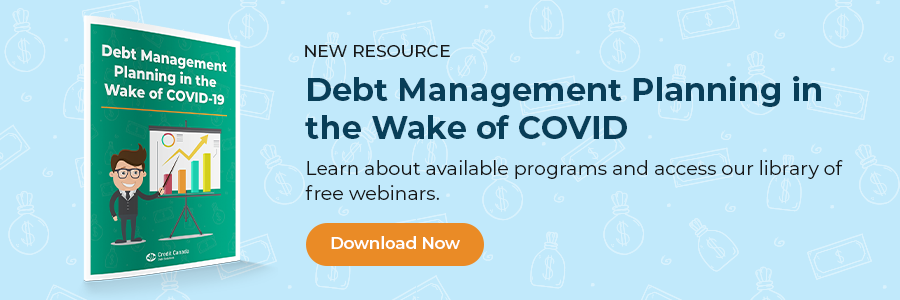
How to Prepare for a Divorce During COVID
The idea of a “COVID divorce” is very real, and unfortunately it’s impacting many Canadians, including Credit Canada's clients. While the coronavirus pandemic has taken a toll on almost everyone – physically, mentally, and financially – the burden has simply been too much for some couples to bear. This has resulted in a significant uptick in divorce rates; in fact, it’s expected that Canada’s current 38% divorce rate will reach a record high due to COVID.
In this blog, we’ll take a look at how to prepare for a divorce during COVID both mentally and financially. Please remember, we are not divorce lawyers. The following information is meant to help you prepare for a divorce, but it should not replace the advice of a lawyer. If you have legal questions about divorce matters, it’s important to reach out to a divorce lawyer for answers.
Why Are Divorce Rates in Canada Rising?
The “COVID divorce” is not just a Canadian phenomenon. China and Italy, two of the countries that initially felt the impact of COVID-19, saw a spike in divorce rates once restrictions were lifted. In the United States, divorce agreement sales witnessed a staggering 34% increase in 2020 compared to 2019.
If a marriage was already on rocky ground before the pandemic, COVID seems to have pushed these marriages over the edge in Canada for a number of reasons. This includes financial stress, boredom, lack of alone time and space to pursue personal interests, and conflicts regarding kids and household responsibilities.
Even at Credit Canada, we’ve seen an increase in the number of people calling us for debt help as a result of divorces and separations during COVID. In some cases, clients have relied on payday loans and other high-risk lenders to get by on a single income, which has only buried them deeper into a pit of debt.
How to Prepare for a Divorce While Married
Preparing for divorce is stressful no matter what, but it’s undoubtedly even more challenging during the pandemic. Regardless of COVID-19, there are steps you should take when planning for divorce. And remember, the best way to start over is by ending things well, so working together with your spouse, if possible, is always the best way to get through a divorce amicably.
1. Talk to a Marriage Counsellor or Registered Therapist
Is there any hope for your marriage? If there’s a chance you may be able to work things out, and you and your spouse want to, a marriage counsellor may be able to help you rebuild what’s broken. Even if you and your spouse have made up your mind that there will be no reconciliation, a marriage counsellor can help you both understand what went wrong (and stop those lingering thoughts) and provide divorce tips, such as different ways to cope and how to best move forward.
If your spouse refuses to participate in counselling but you’re mentally struggling with the impending divorce, seek out a qualified professional of your own. Don’t be ashamed to get help! And if you can’t meet with a registered therapist in-person due to COVID, any counselling can generally be done virtually.
2. Speak with a Lawyer
Ultimately, you may not need a lawyer to handle your divorce, but it doesn’t hurt to speak to one. Getting divorce advice from a legal professional is how many people protect themselves in a divorce. Most lawyers offer a free consultation by phone or video chat and they can discuss your options as there is a lot to consider, especially if shared assets and/or children are involved. Divorce Canada also provides a step-by-step general overview of the divorce process on their website that you may want to check out.
3. Keep a Cool Head
Divorces can get ugly, and our current “pandemic pressure cooker” in particular can cause people to act out simply because they aren’t used to having their spouse around 24/7. Unfortunately, this can be used against them later when negotiating a divorce settlement.
So, watch what you say in person and on the phone, and especially digitally. Avoid profanity and don’t vent your anger or engage in heated discussions through text. Do not make disparaging remarks about your spouse on social media. Any of this can be cherry-picked by your spouse’s lawyer and used to damage your case. If your spouse has behaved this way to you, it may be in your best interest to take screenshots of conversations or keep a log of incidents.
4. Gather Your Financial Information
When preparing for a divorce, you need to understand where you stand financially. This means understanding your income, assets, and liabilities. So, gather up pay statements, tax returns, information on bank accounts, investments, retirement funds, pensions, business interests, real estate documents, and liabilities (such as mortgages, student loans, car loans, credit card debt, etc.). Thankfully, much of this can be done online (a major benefit of COVID is that you're at home a lot) and shared through secure online portals if you need to provide financial information to a lawyer or anyone else involved in the divorce process.
If you and your spouse are not on good terms, it may be in your best interest to make copies (simply snapping a picture on your phone will work) of important documents so they don’t “disappear” once the divorce has been initiated.
5. Create a Budget
After a divorce, do you know how much money you will need to cover your living expenses? Unless you and your spouse have kept your finances separate, this is something you’ll need to know. It may simply be for your own knowledge, or it may help a lawyer negotiate spousal and/or child support payments. By taking the time to acquire the financial information discussed in step #4, you should be able to put together your budget with relative ease (be sure to take into account any expenses that may increase or decrease; for example, perhaps you’ll need to spend more on gas if you’re moving further from work, but less on groceries since your spouse will have the kids). We’ve made budgeting even easier for you with our free, downloadable Budget Planner + Expense Tracker.
6. Safeguard Your Assets
Perhaps unsurprisingly, money is the number one cause of divorce in Canada with 68% saying that fighting over money led to their split. So, it’s important to take some protective measures before discussing divorce. This may include closing joint credit card and bank accounts, opening your own bank account, and taking a credit card out in your own name (if you don’t have one).
In our blog, Debt and Divorce: What You Need to Know, we cover the most common questions about divorce and money. Checking out this blog should definitely be on your divorce preparation checklist.
7. Consider Living Arrangements
Are either you or your spouse looking to make an immediate move? Do you both want to move, and sell your current home? Will you rent or buy? Or maybe things are amicable enough that you both want to stay put until the pandemic has passed. There is a lot to consider regarding living arrangements when divorcing. The real estate market in Canada remains active despite COVID, so it’s best to start doing your research now, especially if buying or selling is in the near future.
8. Discuss a Parenting Plan
If the children are cooped up with you at home due to COVID, it can be difficult to discuss a co-parenting divorce plan with your spouse. However, finding the time is highly recommended if you and your spouse can amicably discuss logistics, including the children’s living arrangements, travel between households, education and/or homeschooling duties (if applicable), holidays, healthcare, religious upbringing, etc.
When deciding on parenting arrangements, it’s important to remain focused on the best interests of the child and determine a plan that best encourages their personal development, happiness, and success. The Canada Department of Justice has put together a comprehensive guide to making parenting arrangements that we recommend reviewing if you’re in this situation.
Taking Care of Yourself During a Divorce
Many of us are under immense financial pressure right now as the pandemic continues to impact our lives. When our marriage is crumbling, that adds another layer that can really take its toll on our physical and mental well-being. We believe one of the best things to do as you go through a divorce is to speak with a licensed professional, either with or without your spouse, to make sure you’re getting the emotional support you need.
Credit Canada Can Help with the Financial Fallout of a Divorce
Of course, if your divorce has you concerned about money, and especially debt, Credit Canada can help with that. You can book a free and confidential counselling session with any one of our certified Credit Counsellors by calling 1.800.267.2272. During this free appointment, we can review your finances, talk about creating a budget when going from a double income household to a single income household, and even discuss the possibility of a Debt Consolidation Program if it makes sense for your particular situation.
We can also speak with both you and your spouse prior to the divorce to help you sort out your finances together (or separately). Either way, we’re here to support you with free financial advice and debt relief options.
Frequently Asked Questions
Have questions? We are here to help
A Debt Consolidation Program (DCP) is an arrangement made between your creditors and a non-profit credit counselling agency. Working with a reputable, non-profit credit counselling agency means a certified Credit Counsellor will negotiate with your creditors on your behalf to drop the interest on your unsecured debts, while also rounding up all your unsecured debts into a single, lower monthly payment. In Canada’s provinces, such as Ontario, these debt payment programs lead to faster debt relief!
Yes, you can sign up for a DCP even if you have bad credit. Your credit score will not impact your ability to get debt help through a DCP. Bad credit can, however, impact your ability to get a debt consolidation loan.
Most people entering a DCP already have a low credit score. While a DCP could lower your credit score at first, in the long run, if you keep up with the program and make your monthly payments on time as agreed, your credit score will eventually improve.
Anyone who signs up for a DCP must sign an agreement; however, it's completely voluntary and any time a client wants to leave the Program they can. Once a client has left the Program, they will have to deal with their creditors and collectors directly, and if their Counsellor negotiated interest relief and lower monthly payments, in most cases, these would no longer be an option for the client.

